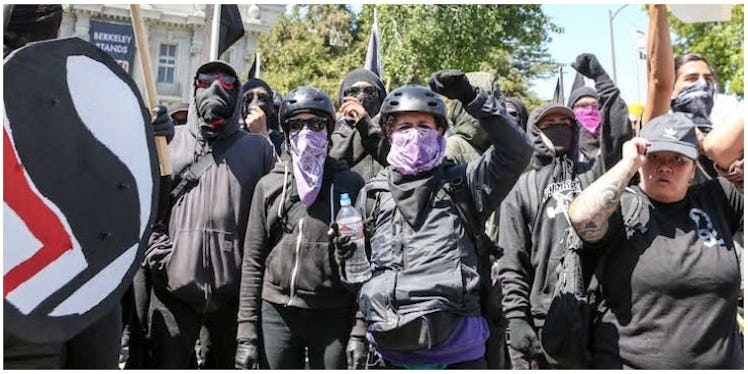
The Antifa Movement Is All About Fighting Fascism — Here's What You Need To Know
After violence erupted at an Aug. 27 white supremacist rally in Berkeley, California, Antifa, a leftist movement, has, once again, been thrust into the spotlight. The violence that occurred has left many wondering what Antifa does. Are they dangerous? Aren't they the fascists?
Well, the question is simple and so, it turns out, is the answer.
The basics.
First things first: Antifa is short for "anti-fascist." And they are exactly what their name says. They say they oppose fascism "by any means necessary," according to Mark Bray, a historian and Antifa expert who wrote about them for the The Washington Post.
To dig a little further: Antifa is a loosely organized collective of leftists with varying political beliefs. You can be a communist and Antifa. You can be a Democratic Socialist and Antifa. You can be an anarchist and Antifa.
Some cities have active chapters that hold regular meetings, but they're not so much a traditional organization as they are a political movement or ideology. Members come together for one main purpose: defeating fascism. In the United States, Antifa is also explicitly anti-racist, according to Bray. These groups are also more often than not anti-capitalist and anti-government.
A brief history of the movement.
Their history is a bit muddy, but according to The Economist, Antifa grew from Anti-Fascist Action, an umbrella name for anti-fascism and anti-Nazism political movements in 1930s Europe. Anti-Fascist Action re-emerged at the end of World War II and organized alliances with socialists and communists to go after Nazis and organize politically.
They re-emerged yet again in the 1980s, as the skinhead and neo-Nazi movement grew in Europe, and simultaneously developed in the United States as Anti-Racist Action. In fact, Anti-Racist Action and Antifa are so closely related that Anti-Racist Action lists Antifa chapters as affiliates.
The Antifa movement re-emerges whenever neo-Nazi and fascist threats start to grow.
What do they want?
The short version is this: White supremacy is growing in the United States, according to a CBS News report, and Antifa believes that with white supremacy comes fascism.
After all, fascism, though hard to pin down exactly, stresses race and national identity, and it advocates total control of people and their identities, not individualism. That emphasis on white nationalism is at odds with the changing face of the United States, which is becoming less white, less Christian, and more heavily populated by immigrants.
In short? Antifa wants to prevent fascism and racism from rising in the United States.
What does Antifa do?
It depends on the chapter. Many Antifa chapters track local racist, neo-Nazi, and fascist activity, and they try to fight it at every chance. Rose City Antifa, the Portland, Oregon chapter, for instance, organizes direct actions, educational and solidarity events, and tries to creative leftist spaces. According to Rose City Antifa, their goal is to make sure fascism doesn't have a safe space to organize and grow.
One of their main functions is to show up at right-wing rallies and protests -- like the Aug. 12 Unite the Right rally that led to anti-racist counter-protester Heather Heyer's death -- to counteract messages of hate, racial purity, and fascism.
OK, but I've heard that they're violent.
There are absolutely instances of violence from Antifa members. The violence that erupted in Berkeley over the weekend of August 25-27, for instance, was committed by Antifa individuals, dressed in black, according to The Washington Post.
Incidents like this are where the line "Antifa are the real fascists" comes from. After all, fascism and violence are closely related, as many fascists believed in achieving their goals by any means necessary.
But the nature of Antifa -- a loose collective of leftist individuals -- means that there will be outliers. Some will interpret their principle "by any means necessary" to mean violence. There will be individual instances of violence, from person to person, chapter to chapter. That doesn't make it OK, and the violence that occurred was condemned by many on the right and the left, including Rep. Nancy Pelosi. This, however, doesn't mean that Antifa as a whole should be condemned.
We should also keep in mind that there were also instances of Antifa protecting peaceful protesters from right-wing attacks at Charlottesville, according to first-hand accounts published by Slate.
So, at the end of the day, what is Antifa? A lot of things. But mostly, they're exactly what they proclaim themselves: Anti-Fascists.